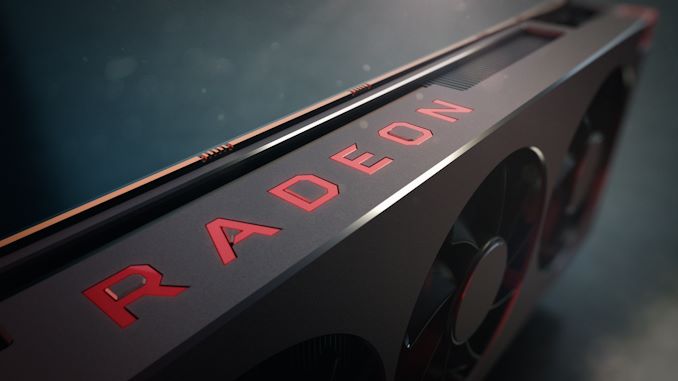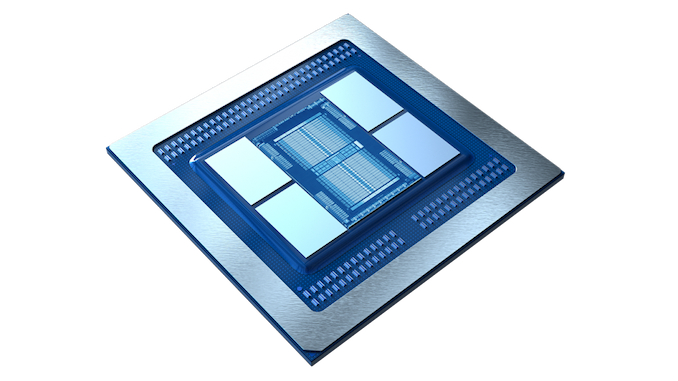The AMD Radeon VII Review: An Unexpected Shot At The High-End
by Nate Oh on February 7, 2019 9:00 AM ESTFinal Words
While there are definitely more areas to investigate, what we've seen of the Radeon VII is still the first 7nm gaming GPU, and that is no small feat. But beyond that, bringing it to consumers allows a mid-generation option for buyers; and the more enthusiast-grade choices, the merrier. The Radeon VII may be a dual-use prosumer/gaming product at heart, but it still has to measure up to being the fastest gaming card of the Radeon stack.
At the risk of being redundant, I can’t help but emphasize how surprised both Ryan and I are that this card is even here at this time. We’re still very early into the 7nm generation, and prior to last month, AMD seemed content to limit the Vega 20 GPU to their server-grade Radeon Instinct cards. Instead a confluence of factors has come into place to allow AMD to bring a chip that, by their own admission was originally built for servers, to the consumer market as a mid-generation kicker. There isn’t really a good precedent for the Radeon VII and its launch, and this makes things quite interesting from tech enthusiast point of view.
Kicking off our wrap-up then, let's talk about the performance numbers. Against its primary competition, the GeForce RTX 2080, the Radeon VII ends up 5-6% behind in our benchmark suite. Unfortunately the only games that it takes the lead are in Far Cry 5 and Battlefield 1, so the Radeon VII doesn't get to ‘trade blows’ as much as I'm sure AMD would have liked to see. Meanwhile, not unlike the RTX 2080 it competes with, AMD isn't looking to push the envelope on price-to-performance ratios here, so the Radeon VII isn't undercutting the pricing of the 2080 in any way. This is a perfectly reasonable choice for AMD to make given the state of the current market, but it does mean that when the card underperforms, there's no pricing advantage to help pick it back up.
Comparing the performance uplift over the original RX Vega 64 puts Radeon VII in a better light, if not a bit of a surprising one. By the numbers, the latest Radeon flagship is around 24% faster at 1440p and 32% faster at 4K than its predecessor. So despite an interesting core configuration that sees the Radeon VII ship with fewer CUs than the RX Vega 64, the Radeon VII pulls well ahead. Reference-to-reference, this might even be grounds for an upgrade rather than a side-grade.
All told, AMD came into this launch facing an uphill battle, both in terms of technology and product positioning. And the results for AMD are mixed. While it's extremely difficult to extract the benefits of 16GB of VRAM in today's games, I'm not ready to write it off as unimportant quite yet; video card VRAM capacities haven't changed much in the last two and a half years, and perhaps it's time it should. However at this moment, AMD's extra VRAM isn't going to do much for gamers.
Content creation, on the other hand, is a more interesting story. Unlike games there is no standard workload here, so I can only speak in extremely broad strokes. The Radeon VII is a fast card with 16GB of VRAM; it's a card that has no parallel in the market. So for prosumers or other professional vizualization users looking to work on the cheap, if you have a workload that really does need more than the 8 to 11 gigabytes of VRAM found in similarly priced cards, then the Radeon VII at least warrants a bit of research. At which point we get into the merits of professional support, AMD's pro drivers, and what AMD will undoubtedly present to pro users down the line in a Radeon Pro-grade Vega 20 card.
As for AMD's technology challenges, the upside for the company is that the Radeon VII is definitely Vega improved. The downside for AMD is that the Radeon VII is still Vega. I won't harp too much on ray tracing here, or other gaming matters, because I'm not sure there's anything meaningful to say that we haven't said in our GeForce reviews. But at a broad level, Vega 20 introduces plenty of small, neat additions to the Vega architecture, even if they aren't really for consumers.
The bigger concern here is that AMD's strategy for configuring their cards hasn't really changed versus the RX Vega 64: AMD is still chasing performance above all else. This makes a great deal of sense given AMD's position, but it also means that the Radeon VII doesn't really try to address some of its predecessor's shortcomings, particularly against the competition. The Radeon VII has its allures, but power efficiency isn’t one of them.
Overall then, the Radeon VII puts its best foot forward when it offers itself as a high-VRAM prosumer card for gaming content creators. And at its $699 price point, that's not a bad place to occupy. However for pure gamers, it's a little too difficult to suggest this card instead of NVIDIA's better performing GeForce RTX 2080.
So where does this leave AMD? Fortunately for the Radeon rebels, their situation is improved even if the overall competitive landscape hasn’t been significantly changed. It's not a win for AMD, but being able to compete with NVIDIA at this level means just that: AMD is still competitive. They can compete on performance, and thanks to Vega 20 they have a new slew of compute features to work with. It's going to win AMD business today, and it's going to help prepare AMD for tomorrow for the next phase that is Navi. It's still an uphill battle, but with Radeon VII and Vega 20, AMD is now one more step up that hill.












289 Comments
View All Comments
Icehawk - Thursday, February 7, 2019 - link
FFXV results sure look CPU limited to me - why aren't you running at least an 8700 @ 5ghz?Oxford Guy - Thursday, February 7, 2019 - link
They look like GameWorks or something to me but I can't see why anyone cares about FF anyway. I hurt my face smirking when I saw the footage from that benchmark. Those hairstyles and that car... and they're going fishing. It was so bad it was Ed Wood territory, only it takes itself seriously.luisfp - Thursday, February 7, 2019 - link
People don't forget that Vega GPUs have the memory beside the GPU core, therefore making it more hot that normal GPUs out there. That has a lot to do with how hot it seems to be, the temperature tends to raise more due to memory temps in same area.just4U - Thursday, February 7, 2019 - link
True enough but owners of the 56/64 have found many work arounds to such things as the cards have not needed as much power as they push out. My cards (56s) use 220W of power per card They never go over 65c in any situation and usually sit in the high 50s to low 60s. with their undervolts.luisfp - Thursday, February 7, 2019 - link
I believe that Vega GPUs have the memory beside the GPU core, therefore making it more hot that normal GPUs out there. That might have a lot to do with how hot it seems to be, the temperature tends to raise more due to memory temps in same area.just4U - Thursday, February 7, 2019 - link
Better than a 64 in all situations and comparable to a 1080ti in all situations with only 5-6% performance hits against the 2080 which is costing 50-100 more here in Canada (according to pre-order sales) Yep, Im sold.ballsystemlord - Thursday, February 7, 2019 - link
Your favorite spelling/grammar guy is here. (AT Audience: Boo!)"Faced with a less hostile pricing environment than many were first expecting, AMD has decided to bring Vega 20 to consumers after all, duel with NVIDIA one of these higher price points."
Missing words (and & at):
"Faced with a less hostile pricing environment than many were first expecting, AMD has decided to bring Vega 20 to consumers after all, and duel with NVIDIA at one of these higher price points."
"Which is to say that there's have been no further developments as far as AMD's primitive shaders are concerned."
Verb tense problem:
"Which is to say that there's been no further developments as far as AMD's primitive shaders are concerned."
Thanks for the review!
I read the whole thing.
The F@H results for Vega are higher than I predicted (Which is a good thing!).
Ryan Smith - Thursday, February 7, 2019 - link
"Your favorite spelling/grammar guy is here. (AT Audience: Boo!)"You're always welcome here. Pull up a chair!
ballsystemlord - Friday, February 8, 2019 - link
I was joking. Some site content creators call people like me "The spelling and grammar trolls".I can never really be certain, so I try to be a little funny in hopes that no body will take my corrections as "troll" actions.
I don't know how you guys feel, but you've always taken mine and others corrections into consideration.
Ryan Smith - Saturday, February 9, 2019 - link
Our flaws and errors are our own doing. When pointed out, it's our job as journalists to correct them. So as long as people are being polite about it, we appreciate the feedback.